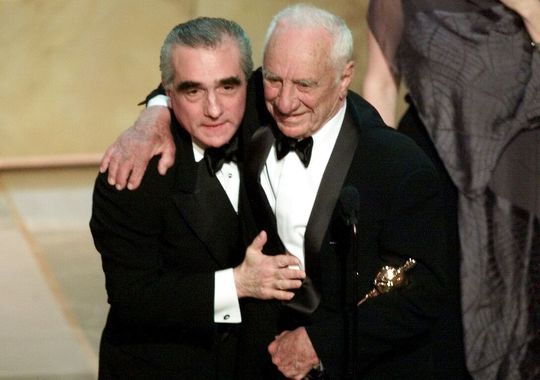 SCORSESE AND KAZAN AT THE OSCARS IN 1999Scorsese's very personal tribute to a film master
SCORSESE AND KAZAN AT THE OSCARS IN 1999Scorsese's very personal tribute to a film masterThis 60-minute documentary is a love-letter, really, from Martin Scorsese, perhaps the most celebrated major American filmmaker of today, to his controversial hero, artistic model, and emotional influence, once the greatest American filmmaker (they called them directors back then) of his day, Elia Kazan. Kazan of course is the author of three great movies of their time,
On the Waterfront, A Streetcar Named Desire (the latter not much discussed here), and
East of Eden, showcasing the Actors Studio talents of Marlon Brando and James Dean. Kazan was a co-founder of the Actors Studio. But Kazan's favorite film was his black and white immigrant epic,
America America, which opens this film (in a gorgeous pristine restoration), and emerges as deeply significant to Scorsese too.
A celebration of the films of Elia Kazan (very selectively considered),
Letter to Elia goes over Kasan's personal history, his rise as an actor on Broadway, then as a theatrical director, finally as a maker of what at first were mostly filmed plays in Hollywood. The reach of Kazan's whole career is considered. And that includes his very questionable "outing" of 8 fellow leftists to HUC Congressional witchhunters in the Fifties. Scorsese describes this, which meant even the Academy's very late lifetime achievement award was much questioned; but he doesn't justify or even explain it. Why did Kazan do that? How could he do it? The only implication is that for Scorsese, Kazan was too important an early influence to become a fallen idol, so he straddles the fence. This is a panegyric, not a cool-headed analysis. Interestingly enough, Kazan did do his best film work after this betrayal. But where his films may seem dated today, Scorsese prefers to see them as he did when young, vibrant, exiting, and personally significant. Scorsese's later personal friendship with Kazan is documented with many stills and his loyalty and support movingly shown by their embrace at the Academy Awards honorary Oscar time, when many refused to stand to celebrate the old man in 1999 when he was 90. He died in 2003.
This is also very much a spoken and illustrated tribute to Scorsese's lonely cinephile youth and to the old classic New York movie houses, now all gone, where he sat alone after buying a ticket for 12 or 15 cents and sighed and sobbed with the family conflicts of Brando and Steiger in
Waterfront and Dean in
Eden. Scorsese goes over specific scenes in some detail, playing the whole speech by Brando that leads up to "I coulda been a contenda." The director is talking about love of movies, but first and foremost he recounts how these films were personal psychodramas for him, and also in the case of
On the Waterfront significantly drew realistically on the "mean streets" world he himself grew up in, in Little Italy. It's only later, the director suggests, that he went back and studied the technical aspects, the camerawork and editing of these for him seminal films. It's not noted by Scorsese, but where Kazan made stars of Brando and Dean, he created idols himself like Di Nero and DiCaprio.
My own favorite is
America America, whatever the social or artistic significance of Kazan's better known films; so it's nice to know it was the one that mattered most to him, and to understand why. It was based on the life of an uncle, and he, and Scorsese too, he says, as (in Kazan's case) from a Greek family out of Turkey, always saw the world as an outsider.
Made as one of the American Masters series for American public television. Narrated, written and directed by Martin Scorsese. Co-authored and co-directed by Kent Jones, a former member of the selection committee of the New York Film Festival and the Film Society of Lincoln Center and Associate Director of Programming there. Jones has collaborated with Scorsese on other documentaries, including
My Voyage in Italy. The voice of Kazan in dramatized quotations is performed by Elias Koteas. Seen and reviewed as a sidebar item, a Masterworks series Special Event, as part of the New York Film Festival at Lincoln Center. Debuted simultaneously Sept. 4 at Venice and Telluride, scheduled for Sept. 27 at the NYFF.





